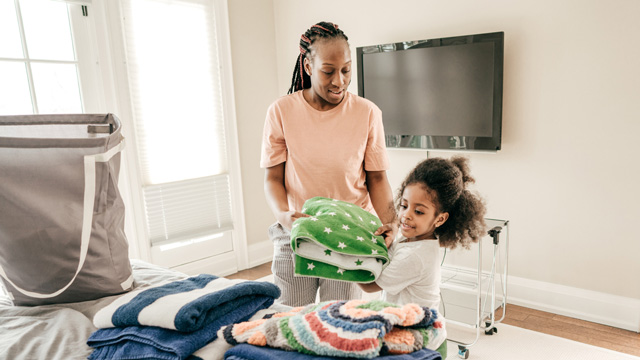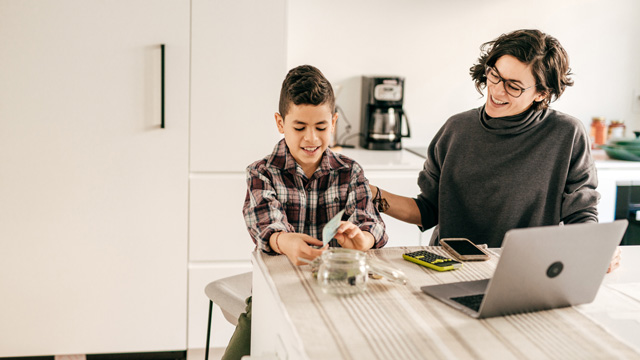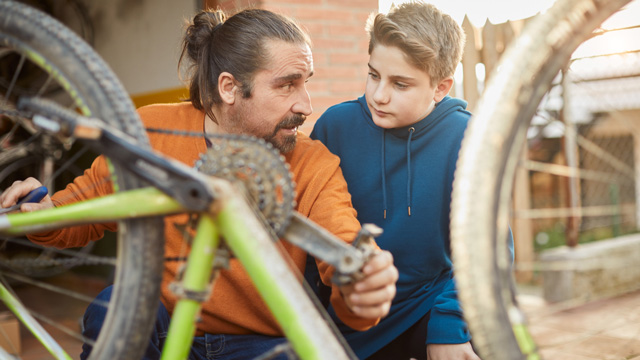Basic Life Skills Kids Should Know at Every Age
Kids should know how to handle these tasks as they grow
Today’s generation of kids might be living in a world with AI, self-driving cars, and other things we used to only see on The Jetsons, but whether it’s learning to cook or managing a budget, there are a few essential life skills kids need to learn as they grow. “For years, researchers believed life skills, like empathy and creative thinking, were innate. Today, we know these skills can be taught and practiced,” says Stephanie Malia Krauss, author of Whole Child, Whole Life: 10 Ways to Help Kids, Live, Learn, and Thrive. Most life skills for kids can happen when their stage and situation encourage and enable it. We asked K-12 educators and child development experts to weigh in on when your crew can master life’s major skills.
Life Skills for Kids Ages 0-2
Nobody expects a baby to balance a checkbook. But there are skills that the two and under set should know before they leave this stage.
Clean Up (Everybody Everywhere)
When a child is 18 months old, they want to copy their caregivers. If you sweep the floor, they want to sweep the floor. Aghogho Boccardi, 7-12 grade educator and founder of Hope Like a Mother, started her kids on chores by having them pick up after themselves at mealtimes. “After a meal, they get down from the table and pick all the large chunks of food from the floor.” She makes it a fun game, and afterward, they help Mom with the handheld vacuum. Notably, she only started this activity when the children showed interest in wanting to sweep.
Swim
“Starting at three months old, babies can begin to learn the skills needed to have confidence in the water, such as breath control and the baby back float. From there, children that continue lessons will add to their skillsets as they master new strokes and set new challenges,” says Chris DeJong, five-time U.S. National Champion swimmer, and Founder and President of Big Blue Swim School.
According to the CDC, drowning is the leading cause of death for children aged four and under. The sooner your mini can master this life-saving skill, the better.
Life Skills for Kids Ages 2-4
By 30 months, most minis can follow simple two-step directions. They can also hold something with one hand while using the other to twist and pull. These developmental milestones mean you can introduce your kiddo to a new set of life skills.
Dress Themselves
This is the age when children want to put on and take off their own clothes. Getting up and out of the house takes three times as long, but let them do it. According to Krauss, this is when children start developing fine motor control. Learning to fasten buttons and put on their shoes gives them much-needed practice with skills they can take into learning to write.
Set the Table
We’re not saying you should give your assistant the fine china. But at this age, you can ask your child to put a fork and (plastic) cup next to each plate on the table. Bonus: you won’t have to guess if they wanted the blue or red cup. Meltdown avoided!
Memorize Your Name and Phone Number
If your preschooler can sing the lyrics to their favorite song, they can learn the seven digits of your phone number. Make it a game so they want to play along. Test your little ones at different times of the day so they’ll remember your number even if they are alone and upset.
Related: All the Chores Kids Should Be Doing, Based on Their Age
Life Skills for Kids Ages 4-6

“Elementary school is a foundational time for children to learn essential social, relational, and learning skills that they will use for the rest of their lives. Through play and projects, kids use, adapt, and strengthen their communication, relationship, and conflict management skills,” says Krauss.
Make Lunch
5-year-olds can learn cooking skills through the ‘cooking kit’ method. “By kindergarten, many children will be able to do the tasks necessary to make their own lunch if they are laid out for them. For example, they could make a peanut butter and jelly sandwich if you put peanut butter, jelly, bread, a butter knife, and a plate out for them. They may not have the executive functioning skills to be fully responsible for making their own lunch, though, and will need a little more development to be able to plan what to pack, pick out the ingredients, and assemble the lunch,” says Letty Rising, K-12 Montessori educator at Montessori Laboratory.
Get Their Own Snack
Everybody wins when your kindergartener can self-serve that after-school munch. Buy adult-approved options. Separate them into single-serve portions. Then leave them in an accessible, designated place, such as a lower cabinet or a drawer in the fridge.
Gather the Laundry
Teach your crew how to use the laundry basket. Realistically, four-year-olds will need you to point at the things that go in the laundry. Kids this age will not remember to empty their pockets. And if your kindergartener is also in charge of cleaning up their room, you will find strange things stuffed in the basket along with their socks. Wash with caution.
It’s definitely easier to do the laundry yourself in the short term. But children who start learning now will be well-equipped to wash their laundry in the middle-elementary years.
Life Skills for Kids Ages 6-8
Until six, most of your kids’ cleaning is heavily supervised and play-based. Rising says, “By the time children reach 6 years of age, they can be responsible for sweeping the floors as part of their chores, and likely also parts of cleaning the bathrooms like wiping down the counter.” This means caregivers can now pass on old chestnuts, such as “You were old enough to make the mess, so you’re old enough to clean it.” Huzzah!
Run the Washing Machine
According to Dr. Ryan Sultan, board-certified child psychiatrist and Research Professor at Columbia University, children can now learn how to operate a washing machine and fold clean laundry. They will still need periodic reminders on how much detergent to use and how to avoid turning everyone’s whites a light pink.
Operate a Microwave Alone
Microwaving a meal is a big deal for the elementary school set. And they can do so much more than warm up yesterday’s dinner or cook a box of mac and cheese. YouTube is full of recipes for microwave-friendly meals. Spend time watching the videos together for added parent and child time. Budding chefs will need to learn basic microwave safety–no metal in the microwave!—before you turn them loose.
Tie Their Shoes
Six-year-olds have the fine motor skills necessary to learn to tie their shoes. But thanks to the magic of Velcro, compressed morning schedules, and schools that insist on slip-on shoes, children are learning this skill later. According to a 2019 survey commissioned by OSGO to coincide with National Feet Week, “3 in 10 children are still unable to tie their shoelaces on leaving primary school.”
The only way kids can master this skill is with a lot of practice. If there’s no time in the morning for them to lace up their shoes, set aside time later in the day. Some children don’t care to practice this skill. If you have a reluctant lacer, dispense small rewards to get them on board.
Life Skills for Kids Ages 8-10

Your not-so-mini is one of the big kids now. With greater ability comes the opportunity for greater responsibility.
Budget Money
In his book The Opposite of Spoiled, Rob Lieber says that the main point of an allowance is to help “kids learn to save and spend money, a skill they don’t get to practice in many other ways as they grow up.” Learning to delay gratification has a whole host of benefits. According to Lieber, adults who practice self-control as children are more likely to save money and own homes. Lieber’s three-jar method to budget money for saving, spending, and charitable giving is a great place to start.
Many parents discover another upside. Children are much less eager to spend their own money. While minis as young as six can begin to budget, the mid-elementary set has a clearer grasp of time. They will be far more impressed when you say, “If you want that iPhone, you’ll need to save your allowance for six years.”
Practice Online Safety
In a 2019 study from Common Sense Media, 8-12-year-olds spend 31% of their total screen time gaming. And whether they play on a smartphone, a console, or a computer, they can bump into players they don’t know. “One of the first things children need to understand about chatting online is that they could be talking to anyone from anywhere,” advises Philip Wride, Parenting & Education Coach.
“It’s important they know not to share personal information like their name, address, or photos of themselves. The same is true if they play games online–the people they are playing with could potentially be any age. If someone asks for their name, address, or a photo, the child must understand it is a red flag activity and that they should tell an appropriate adult.”
If possible, children should play games and use the internet in a shared space where they can keep an ear and an eye on the activity.
Life Skills for Kids Ages 10-12
“By the end of elementary school, most children can engage in increasingly complex and abstract reasoning and decision making. Academic assignments and learning activities engage them as problem solvers and critical thinkers,” says Stephanie Malia Krauss.
But it’s important to refrain from allowing academic work or sports to crowd out the critical life skills tweens will carry with them into adulthood. If your crew’s time is limited, consider giving them one or two chores and rotating the assignment every week.
Take Out the Trash
Taking the garbage outside isn’t brain surgery. But there are several limiting factors to consider. Is your child strong enough to carry the bag? Are they tall enough to hoist it into the bin? Does your municipality require you to sort your trash into different containers? If the kitchen garbage is too heavy, start your tween off with the recycling.
If your family lives in an apartment with a communal dumpster, your child may need situational awareness to avoid cars in the parking lot. Take your junior janitor with you when you toss the trash and progressively hand over the job.
Make Simple Meals on the Stove
Kids can be taught how to cook on the stove in early elementary school. A tween trained in basic kitchen safety can independently scramble eggs, cook pancakes from a mix, or make a grilled cheese. They will learn best working with you, but more mature tweens can also follow (video or written) recipes. You’ll want to be on hand in case that grilled cheese turns into a flambé.
Life Skills for Kids Ages 12 and Up

12-year-olds are nowhere near old enough to live independently, but this is a great time to help them hone the skills they will take into adulthood.
Cook Family Dinner
This is when cooking practice can really pay off. Teach your tween how to make a complete dinner, then add them to the weekly cooking rotation. If you don’t have the mental energy or cooking know-how to teach this skill, consider using a service like Hello Fresh or Chef’s Plate. Each meal comes with ingredients and step-by-step instructions. Watching your kid cook while you recover from a long day at work is almost like taking a spa day. Even better, your future college student won’t have to survive on ramen packs for four years.
Balance a Checkbook
“Balancing a checkbook is a complex task that requires an understanding of basic math and financial concepts. Generally, it’s best to wait until children are in middle school before introducing them to this skill. This will help ensure they have the necessary foundational skills required to complete the task effectively. Additionally, provide guidance on how to safely and accurately manage finances, such as avoiding overdrafts and using online banking tools if available,” recommends Kalley Hartman, Licensed Marriage and Family Therapist of Ocean Recovery.
Start your middle schooler off with small steps. First, show them how to keep a running total of their credits and expenses. Then show them how to reconcile their tally against the bank balance. You can use a service like Greenlight or Mydoh or act as the bank by collecting receipts and adding them to a paper ledger two days later.
Perform Basic Home Maintenance
According to Dr. Sultan, most tweens and teens are old enough to learn to change a lightbulb, unclog a drain, and reset the circuit breaker. Parents in the know will tell you that getting your teenager to unclog the toilet themselves is a game changer. And a great way to get them to use less bathroom tissue.
Teaching your kids essential life skills might feel overwhelming, but you’re not in it alone. “Kids can learn life skills anytime, anywhere, and with anyone. Children constantly observe, learn, and practice these skills at home, school, in the community, and in whatever activities they engage in. Like reading, some children will master skills more slowly and others more quickly. What’s most important is providing them with instruction, opportunities to practice, and assistance when they need it,” says Krauss.
Related: 12 Essential Life Skills Kids Can Learn from Travel
